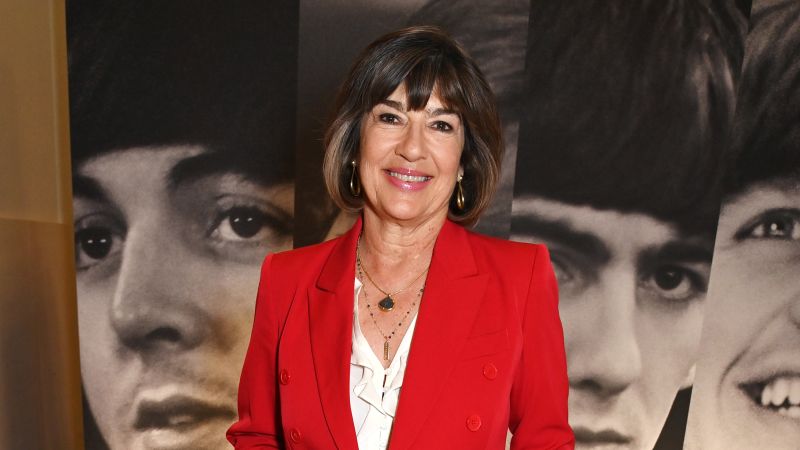Editor’s Note: A version of this article first appeared in the “Reliable Sources” newsletter. Sign up for the daily digest chronicling the evolving media landscape here.
Christiane Amanpour still remembers her humble beginnings at CNN.
Forty years ago, before she was hired by what was then a groundbreaking news startup, she was an electronics graphics operator at a local NBC affiliate, responsible for the various elements that appear on-air during broadcasts. When she arrived in Atlanta to discuss a role at CNN with a recruiter, she did so with only $100 in her pocket and a single suitcase.
“The then-recruiter took one look at me and said, ‘Oh, there’s a vacancy on the foreign desk. You’re foreign. Go fill it,” Amanpour recounted on Tuesday just before she received a standing ovation in the New York newsroom during a 40th anniversary celebration of her remarkable career.
While the job of desk assistant was at the “very, very bottom” of the totem pole (Amanpour said that “you could not get any lower and you could not be paid any less), the position offered her the chance to exit the technical line of journalism and get her foot in the door of the editorial side of the business. From there, with a lot of hard work, she pulled herself up, becoming a script writer, field producer, reporter, and eventually foreign correspondent.
That’s when she was deployed to cover the Gulf War and received a good share of air time reporting from Saudi Arabia. The way she tells it, her fate has been very much intertwined with CNN’s — and in the early 1990s, they were both “exploding onto the international consciousness” at the same time.
Nowadays, the name Amanpour is synonymous with brave field reporting and unflinching interviews, holding the world’s most powerful — and, in some cases, ruthless — leaders to account. Over the span of her impressive career, the veteran reporter has traveled to dozens of countries, interviewed legions of politicians, and shined a spotlight on more injustices than one would probably care to know exist in this world.
But of all the assignments, there is one in particular that snapped to mind when asked which has left the most profound impact on her: Bosnia.
“It was genocide,” Amanpour bluntly recalled, adding that covering the humanitarian crisis that unfolded in the country led her to adopt her trademark “be truthful, but not neutral” motto on journalism.
“I was witnessing, along with my colleagues, who the aggressors were,” she explained. “There was no equivalence either factually or morally. And I didn’t present any equivalence. There was no, ‘On the one hand, on the other hand.’ In situations of gross violations of human rights … you cannot be neutral because then you are an accomplice. All of that came to me, and I distilled it into, ‘We have to be truthful, not neutral.’”
“And it applies to everything,” Amanpour added. “Whether you’re covering Donald Trump, whether you’re covering the climate crisis, whatever you’re covering — you absolutely have to be truthful, which does not mean unobjective. Objective means cover all sides. It does not mean come to the same judgment about all sides.”
Amanpour, now CNN’s chief international anchor, said that she believes there are a number of good journalists who hold US lawmakers’ feet to the fire. But she expressed concern that there is “way too much focus on the horse race in politics, as opposed to the policy and context.”
“I would say if I was a foreign correspondent … I would cover this in the same way that I would cover … threats to democracy in any other part of the world,” Amanpour said. “And I would make sure that you don’t just give a platform to those who survive on hate speech, to those who want to crash down the Constitution and democracy.”
Getting stuck in the mud of process and the machinations of US politics is something that a number of news organizations continue to struggle with. Instead of homing in on the larger picture of democracy under unrelenting assault from autocratic forces within our own borders, it can be easier to instead focus on whether candidates are making savvy political moves. Such coverage, often fueled by a desire for access, offers journalists a way of avoiding the uncomfortable.
“You don’t want to go to the cocktail parties. You don’t want to be liked. You don’t want to rub shoulders,” Amanpour said, calling access journalism “the road to perdition” for journalists. “Your job is not that. You need to be able to hold them constantly accountable.”
Over the course of her storied career at CNN, Amanpour has seen the network at its highest points and lowest valleys — including over the last 20 months where the 4,000-person strong network has grappled with multiple seismic internal blows. And, true to her reputation, Amanpour doesn’t sugarcoat any of it.
“CNN had some very rough years, as we’ve all experienced,” Amanpour said candidly. “And now — I’m happy that this 40th anniversary coincides with a new leadership. Because this is an important moment to seize the reins and to charge full speed ahead.”
“And we’re heading into another election campaign that’s going to be incredibly important,” Amanpour added. “And we’re going to stand up for the values, and the principles, of truth and democracy, human rights, and allowing people to know they have a place to turn, should they choose to want to find the facts.”
Read the full article here










